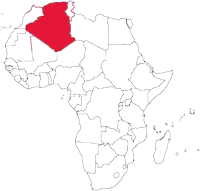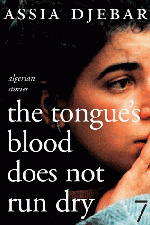
 NOTE: This is an excerpt from a "Trio" which appeared in our fourth issue. You can read the full article here.
NOTE: This is an excerpt from a "Trio" which appeared in our fourth issue. You can read the full article here.
If Children of the New World represents the optimism of the mid 1950s in Assia Djebar's work, The Tongue's Blood Does Not Run Dry represents the sorrow and anger of forty years later. This book comprises seven stories, each inspired by an actual story told to Djebar, and focused on the toll exacted by Algeria's turmoil on its women.
In the first part of the book the reader is faced with the terror of Algeria's Civil War. In a time when 160,000 to 200,000 assassinations took place, to take any side at all was to risk being executed. Women are left coping with murdered parents in "Oran, Dead Language" or a slain spouse in "The Attack" because speaking out against government corruption or oppression earned a death sentence from the OAS death squads.
Yet the alternative was no better. In the most haunting and fairy tale-like story of the collection, "The Woman in Pieces", Islamic fundamentalists callously kill an exceptional teacher in front of her students simply for teaching them fables. Or, in "Non-return Returns", we see even the bond between mother and daughter broken apart simply for sitting with a boy, in an oppressive regard for "the honor of the venerable, betrayed father."
These horrific stories, all the more so for being based in actual experience, serve to memorialize the forgotten voices in the struggle between one oppressor and another.
The second portion of the book looks at those caught between the two worlds of France and Algeria, and the seeming inability for them to coexist peacefully. In "Annie and Fatima" a French mother, seeing her daughter who was kidnapped by the Algerian father, must face a young girl in a chador who "could get used to the idea of having a French mother" but could not get used to a mother who did not observe Islamic law.
In "Félicie's Body", the children of a French mother and Algerian father reflect on the polarity of their lives, each with an Arabic and a French name, two religions, two sets of expectations. As Ourdia/Louise muses, "[It's] as if they had placed their sons and their daughters on a frontier, a crest, a no-man's land…it's as if when we were born you told us, there, you've got two sides, two faces." In the end, they grapple with the fact that modern Algeria would simply not let this duality exist. To bury their mother, they must give her an Arabic name and pay to have her declared Muslim so that she can be interred with her husband in Algeria, as Armand/Karim says, "...two countries (which to disown, which to adopt?)"
In looking at the distance between the optimism of Children of the New World and the despair of The Tongue's Blood Does Not Run Dry, we can see that the plight of women expressed so clearly in Women of Algiers can be read both literally and as a metaphor for Algeria herself. The loss of voice and public identity at the individual level was echoed at the national level. Djebar shows us that to speak up was to be silenced permanently by either OAS fanatics or Islamic extremists; to have an identity other than "French" on one hand or "Arab" on the other might keep you alive, but it left no room to be a bit of both or even Berber. The 1950s changed everything but, in the end, had changed nothing. When all is done, there is almost a tone of "why did we bother?" Assia Djebar's metaphor becomes explicit at the end of the book:

Seven Stories Press, paperback, 9781583227879